Report on Entrepreneurship, Ventures, and Economic Impact Analysis
VerifiedAdded on 2022/12/14
|11
|2485
|357
Report
AI Summary
This report provides a comprehensive analysis of entrepreneurship and small business management, exploring different types of ventures such as small business ventures, scalable start-ups, large companies, and social enterprises. It examines the relationship between these ventures and entrepreneurship typologies, including lifestyle enterprises, growth businesses, and gender-specific firms. The report further analyzes the economic impact of micro and small enterprises using data and statistics, highlighting their contribution to employment and revenue generation in the UK economy. It also determines the importance of start-ups and small businesses in driving economic growth through competitiveness, employment, adaptability, creativity, and overall economic contributions. The report concludes by summarizing the key characteristics, skills, and traits of entrepreneurs, differentiating them from business managers and emphasizing the role of entrepreneurial motivation and mindset in achieving success.

ENTREPRENEURSHIP
AND SMALL
BUSINESS
MANAGEMENT
AND SMALL
BUSINESS
MANAGEMENT
Paraphrase This Document
Need a fresh take? Get an instant paraphrase of this document with our AI Paraphraser
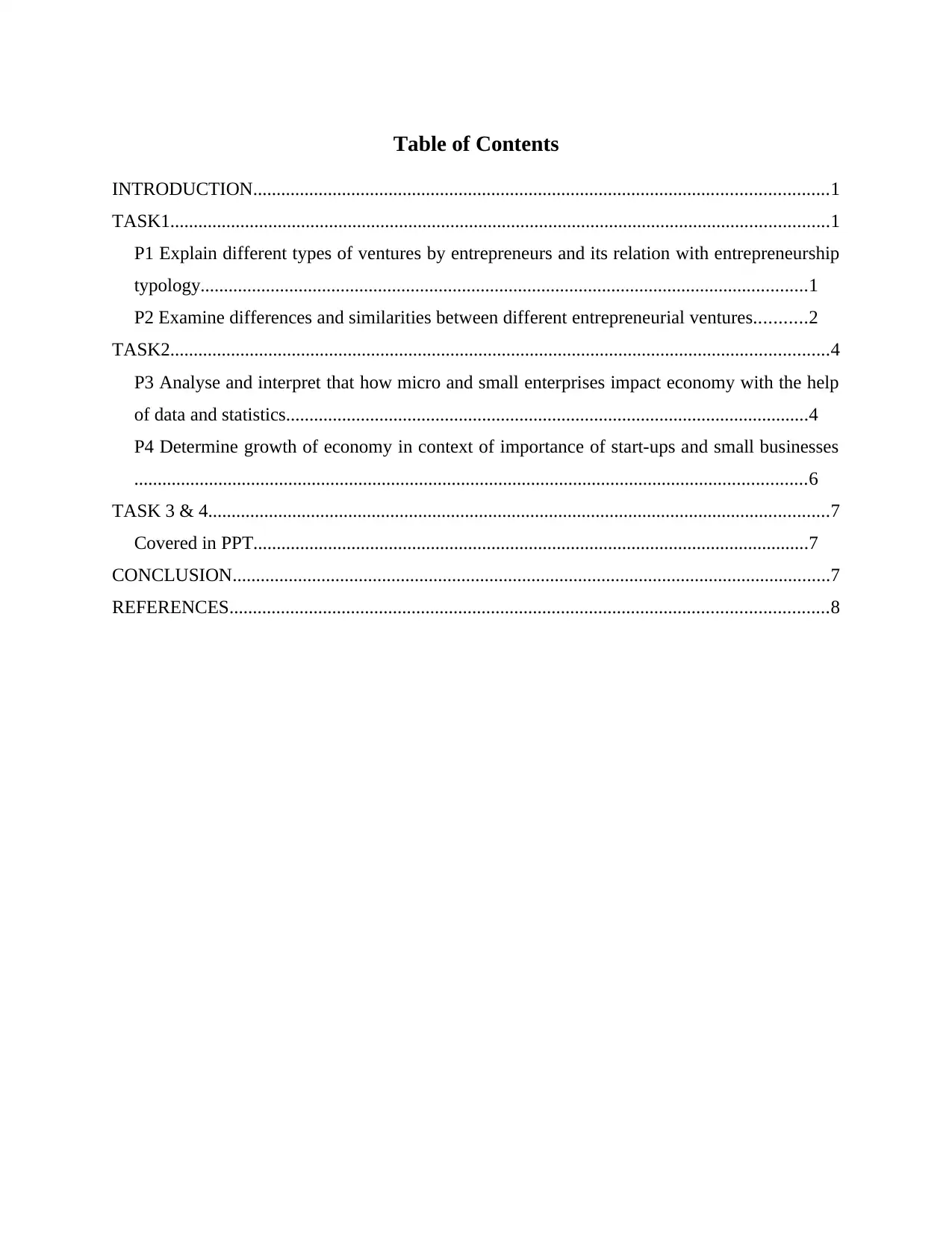
Table of Contents
INTRODUCTION...........................................................................................................................1
TASK1.............................................................................................................................................1
P1 Explain different types of ventures by entrepreneurs and its relation with entrepreneurship
typology..................................................................................................................................1
P2 Examine differences and similarities between different entrepreneurial ventures...........2
TASK2.............................................................................................................................................4
P3 Analyse and interpret that how micro and small enterprises impact economy with the help
of data and statistics................................................................................................................4
P4 Determine growth of economy in context of importance of start-ups and small businesses
................................................................................................................................................6
TASK 3 & 4.....................................................................................................................................7
Covered in PPT.......................................................................................................................7
CONCLUSION................................................................................................................................7
REFERENCES................................................................................................................................8
INTRODUCTION...........................................................................................................................1
TASK1.............................................................................................................................................1
P1 Explain different types of ventures by entrepreneurs and its relation with entrepreneurship
typology..................................................................................................................................1
P2 Examine differences and similarities between different entrepreneurial ventures...........2
TASK2.............................................................................................................................................4
P3 Analyse and interpret that how micro and small enterprises impact economy with the help
of data and statistics................................................................................................................4
P4 Determine growth of economy in context of importance of start-ups and small businesses
................................................................................................................................................6
TASK 3 & 4.....................................................................................................................................7
Covered in PPT.......................................................................................................................7
CONCLUSION................................................................................................................................7
REFERENCES................................................................................................................................8
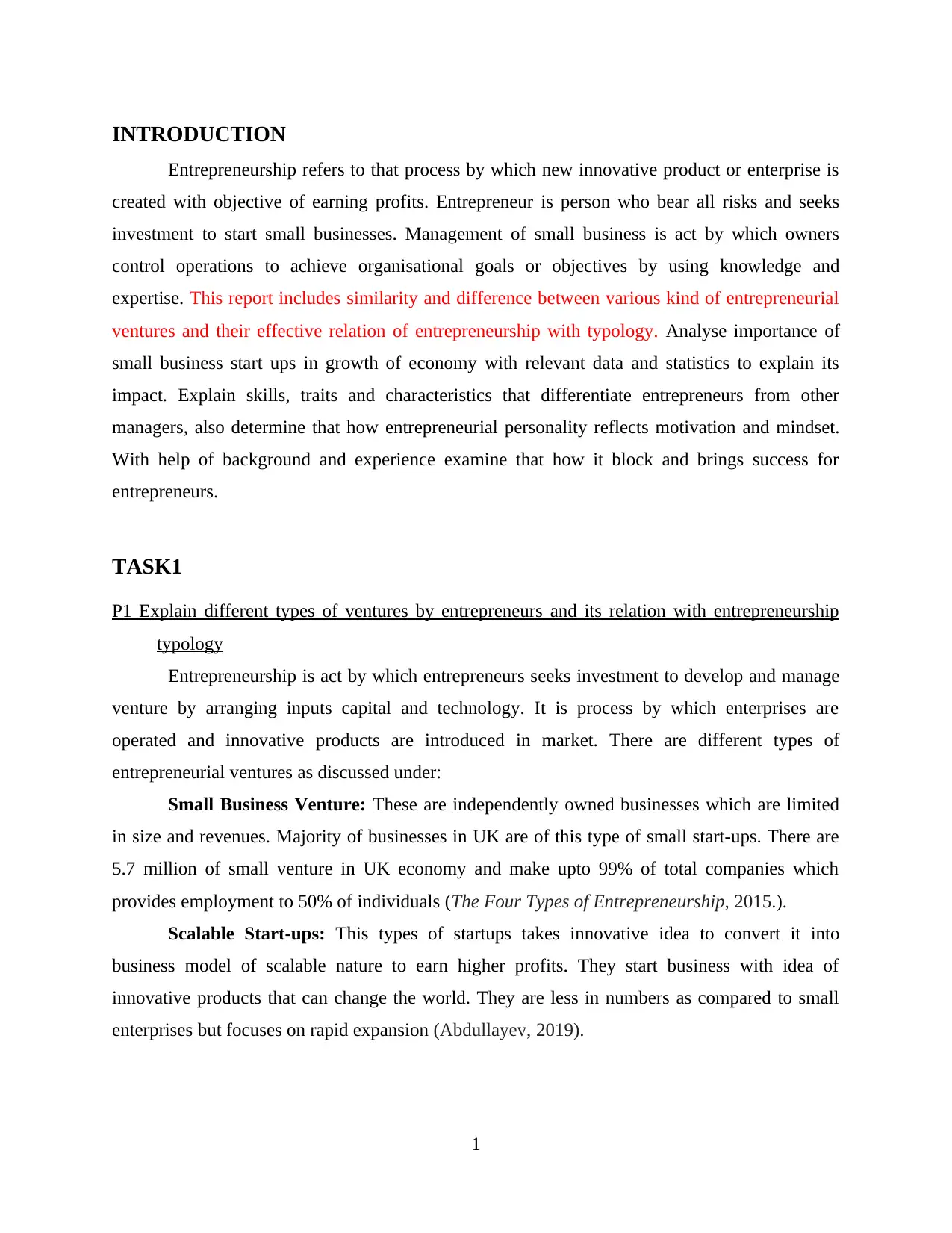
INTRODUCTION
Entrepreneurship refers to that process by which new innovative product or enterprise is
created with objective of earning profits. Entrepreneur is person who bear all risks and seeks
investment to start small businesses. Management of small business is act by which owners
control operations to achieve organisational goals or objectives by using knowledge and
expertise. This report includes similarity and difference between various kind of entrepreneurial
ventures and their effective relation of entrepreneurship with typology. Analyse importance of
small business start ups in growth of economy with relevant data and statistics to explain its
impact. Explain skills, traits and characteristics that differentiate entrepreneurs from other
managers, also determine that how entrepreneurial personality reflects motivation and mindset.
With help of background and experience examine that how it block and brings success for
entrepreneurs.
TASK1
P1 Explain different types of ventures by entrepreneurs and its relation with entrepreneurship
typology
Entrepreneurship is act by which entrepreneurs seeks investment to develop and manage
venture by arranging inputs capital and technology. It is process by which enterprises are
operated and innovative products are introduced in market. There are different types of
entrepreneurial ventures as discussed under:
Small Business Venture: These are independently owned businesses which are limited
in size and revenues. Majority of businesses in UK are of this type of small start-ups. There are
5.7 million of small venture in UK economy and make upto 99% of total companies which
provides employment to 50% of individuals (The Four Types of Entrepreneurship, 2015.).
Scalable Start-ups: This types of startups takes innovative idea to convert it into
business model of scalable nature to earn higher profits. They start business with idea of
innovative products that can change the world. They are less in numbers as compared to small
enterprises but focuses on rapid expansion (Abdullayev, 2019).
1
Entrepreneurship refers to that process by which new innovative product or enterprise is
created with objective of earning profits. Entrepreneur is person who bear all risks and seeks
investment to start small businesses. Management of small business is act by which owners
control operations to achieve organisational goals or objectives by using knowledge and
expertise. This report includes similarity and difference between various kind of entrepreneurial
ventures and their effective relation of entrepreneurship with typology. Analyse importance of
small business start ups in growth of economy with relevant data and statistics to explain its
impact. Explain skills, traits and characteristics that differentiate entrepreneurs from other
managers, also determine that how entrepreneurial personality reflects motivation and mindset.
With help of background and experience examine that how it block and brings success for
entrepreneurs.
TASK1
P1 Explain different types of ventures by entrepreneurs and its relation with entrepreneurship
typology
Entrepreneurship is act by which entrepreneurs seeks investment to develop and manage
venture by arranging inputs capital and technology. It is process by which enterprises are
operated and innovative products are introduced in market. There are different types of
entrepreneurial ventures as discussed under:
Small Business Venture: These are independently owned businesses which are limited
in size and revenues. Majority of businesses in UK are of this type of small start-ups. There are
5.7 million of small venture in UK economy and make upto 99% of total companies which
provides employment to 50% of individuals (The Four Types of Entrepreneurship, 2015.).
Scalable Start-ups: This types of startups takes innovative idea to convert it into
business model of scalable nature to earn higher profits. They start business with idea of
innovative products that can change the world. They are less in numbers as compared to small
enterprises but focuses on rapid expansion (Abdullayev, 2019).
1
⊘ This is a preview!⊘
Do you want full access?
Subscribe today to unlock all pages.

Trusted by 1+ million students worldwide
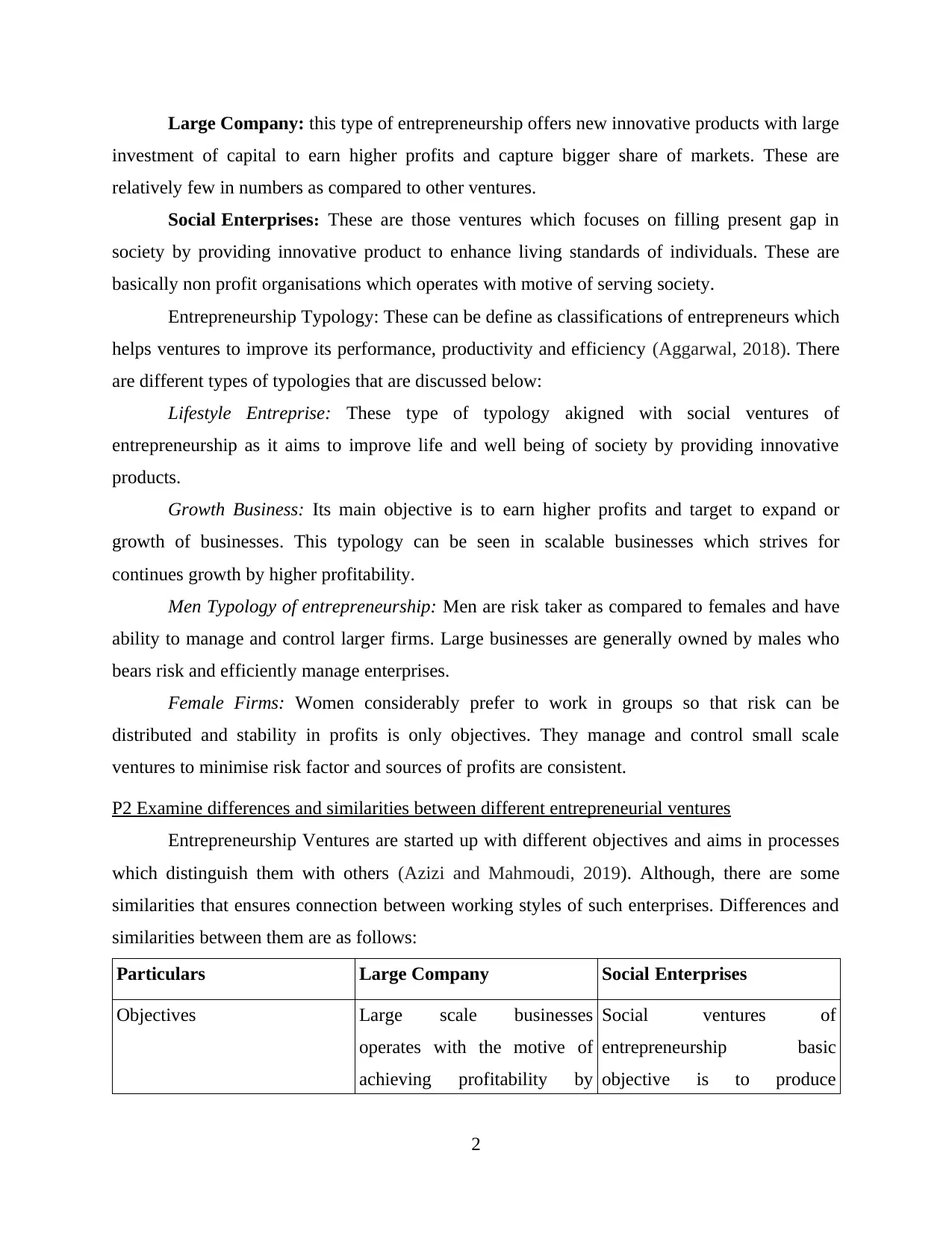
Large Company: this type of entrepreneurship offers new innovative products with large
investment of capital to earn higher profits and capture bigger share of markets. These are
relatively few in numbers as compared to other ventures.
Social Enterprises: These are those ventures which focuses on filling present gap in
society by providing innovative product to enhance living standards of individuals. These are
basically non profit organisations which operates with motive of serving society.
Entrepreneurship Typology: These can be define as classifications of entrepreneurs which
helps ventures to improve its performance, productivity and efficiency (Aggarwal, 2018). There
are different types of typologies that are discussed below:
Lifestyle Entreprise: These type of typology akigned with social ventures of
entrepreneurship as it aims to improve life and well being of society by providing innovative
products.
Growth Business: Its main objective is to earn higher profits and target to expand or
growth of businesses. This typology can be seen in scalable businesses which strives for
continues growth by higher profitability.
Men Typology of entrepreneurship: Men are risk taker as compared to females and have
ability to manage and control larger firms. Large businesses are generally owned by males who
bears risk and efficiently manage enterprises.
Female Firms: Women considerably prefer to work in groups so that risk can be
distributed and stability in profits is only objectives. They manage and control small scale
ventures to minimise risk factor and sources of profits are consistent.
P2 Examine differences and similarities between different entrepreneurial ventures
Entrepreneurship Ventures are started up with different objectives and aims in processes
which distinguish them with others (Azizi and Mahmoudi, 2019). Although, there are some
similarities that ensures connection between working styles of such enterprises. Differences and
similarities between them are as follows:
Particulars Large Company Social Enterprises
Objectives Large scale businesses
operates with the motive of
achieving profitability by
Social ventures of
entrepreneurship basic
objective is to produce
2
investment of capital to earn higher profits and capture bigger share of markets. These are
relatively few in numbers as compared to other ventures.
Social Enterprises: These are those ventures which focuses on filling present gap in
society by providing innovative product to enhance living standards of individuals. These are
basically non profit organisations which operates with motive of serving society.
Entrepreneurship Typology: These can be define as classifications of entrepreneurs which
helps ventures to improve its performance, productivity and efficiency (Aggarwal, 2018). There
are different types of typologies that are discussed below:
Lifestyle Entreprise: These type of typology akigned with social ventures of
entrepreneurship as it aims to improve life and well being of society by providing innovative
products.
Growth Business: Its main objective is to earn higher profits and target to expand or
growth of businesses. This typology can be seen in scalable businesses which strives for
continues growth by higher profitability.
Men Typology of entrepreneurship: Men are risk taker as compared to females and have
ability to manage and control larger firms. Large businesses are generally owned by males who
bears risk and efficiently manage enterprises.
Female Firms: Women considerably prefer to work in groups so that risk can be
distributed and stability in profits is only objectives. They manage and control small scale
ventures to minimise risk factor and sources of profits are consistent.
P2 Examine differences and similarities between different entrepreneurial ventures
Entrepreneurship Ventures are started up with different objectives and aims in processes
which distinguish them with others (Azizi and Mahmoudi, 2019). Although, there are some
similarities that ensures connection between working styles of such enterprises. Differences and
similarities between them are as follows:
Particulars Large Company Social Enterprises
Objectives Large scale businesses
operates with the motive of
achieving profitability by
Social ventures of
entrepreneurship basic
objective is to produce
2
Paraphrase This Document
Need a fresh take? Get an instant paraphrase of this document with our AI Paraphraser
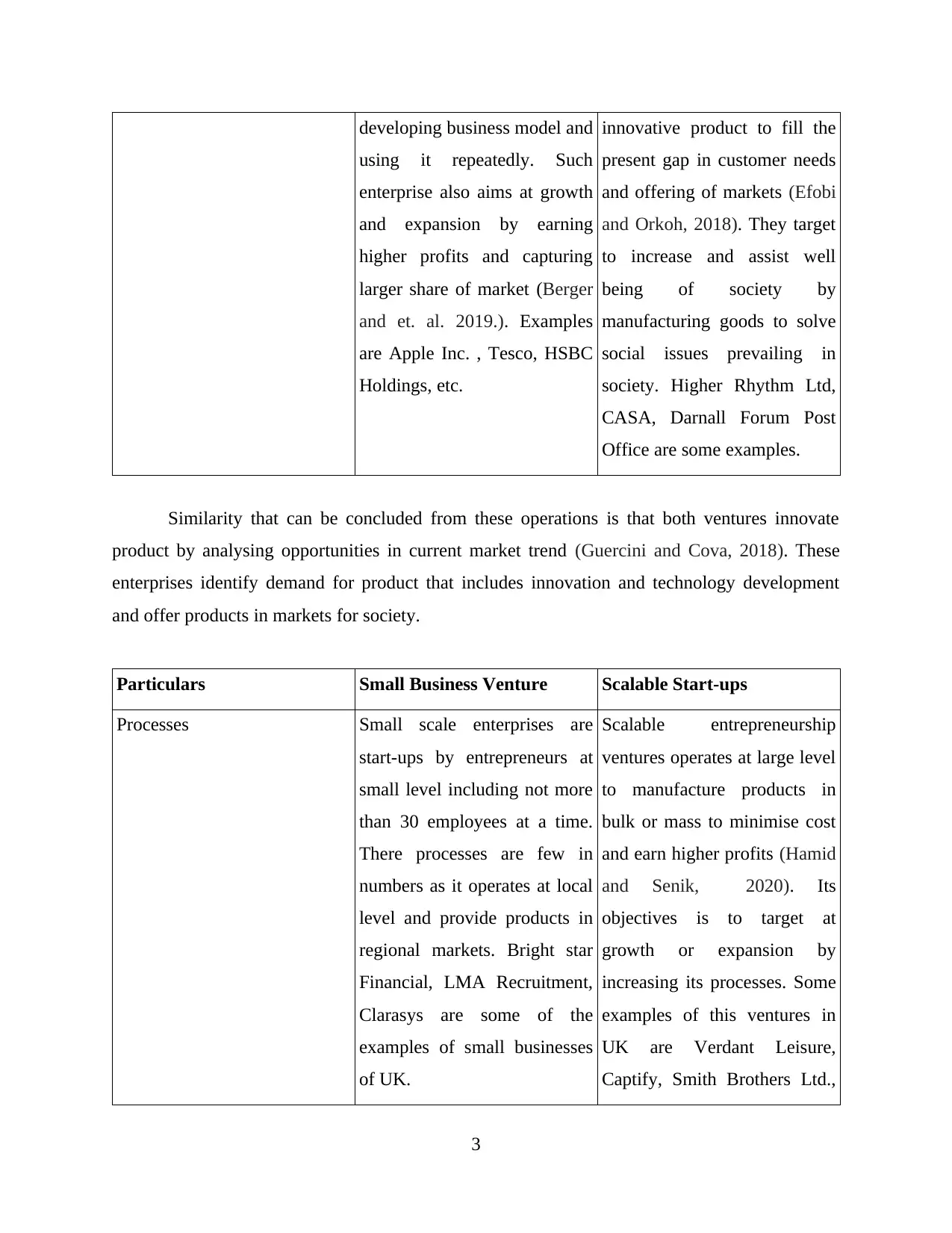
developing business model and
using it repeatedly. Such
enterprise also aims at growth
and expansion by earning
higher profits and capturing
larger share of market (Berger
and et. al. 2019.). Examples
are Apple Inc. , Tesco, HSBC
Holdings, etc.
innovative product to fill the
present gap in customer needs
and offering of markets (Efobi
and Orkoh, 2018). They target
to increase and assist well
being of society by
manufacturing goods to solve
social issues prevailing in
society. Higher Rhythm Ltd,
CASA, Darnall Forum Post
Office are some examples.
Similarity that can be concluded from these operations is that both ventures innovate
product by analysing opportunities in current market trend (Guercini and Cova, 2018). These
enterprises identify demand for product that includes innovation and technology development
and offer products in markets for society.
Particulars Small Business Venture Scalable Start-ups
Processes Small scale enterprises are
start-ups by entrepreneurs at
small level including not more
than 30 employees at a time.
There processes are few in
numbers as it operates at local
level and provide products in
regional markets. Bright star
Financial, LMA Recruitment,
Clarasys are some of the
examples of small businesses
of UK.
Scalable entrepreneurship
ventures operates at large level
to manufacture products in
bulk or mass to minimise cost
and earn higher profits (Hamid
and Senik, 2020). Its
objectives is to target at
growth or expansion by
increasing its processes. Some
examples of this ventures in
UK are Verdant Leisure,
Captify, Smith Brothers Ltd.,
3
using it repeatedly. Such
enterprise also aims at growth
and expansion by earning
higher profits and capturing
larger share of market (Berger
and et. al. 2019.). Examples
are Apple Inc. , Tesco, HSBC
Holdings, etc.
innovative product to fill the
present gap in customer needs
and offering of markets (Efobi
and Orkoh, 2018). They target
to increase and assist well
being of society by
manufacturing goods to solve
social issues prevailing in
society. Higher Rhythm Ltd,
CASA, Darnall Forum Post
Office are some examples.
Similarity that can be concluded from these operations is that both ventures innovate
product by analysing opportunities in current market trend (Guercini and Cova, 2018). These
enterprises identify demand for product that includes innovation and technology development
and offer products in markets for society.
Particulars Small Business Venture Scalable Start-ups
Processes Small scale enterprises are
start-ups by entrepreneurs at
small level including not more
than 30 employees at a time.
There processes are few in
numbers as it operates at local
level and provide products in
regional markets. Bright star
Financial, LMA Recruitment,
Clarasys are some of the
examples of small businesses
of UK.
Scalable entrepreneurship
ventures operates at large level
to manufacture products in
bulk or mass to minimise cost
and earn higher profits (Hamid
and Senik, 2020). Its
objectives is to target at
growth or expansion by
increasing its processes. Some
examples of this ventures in
UK are Verdant Leisure,
Captify, Smith Brothers Ltd.,
3
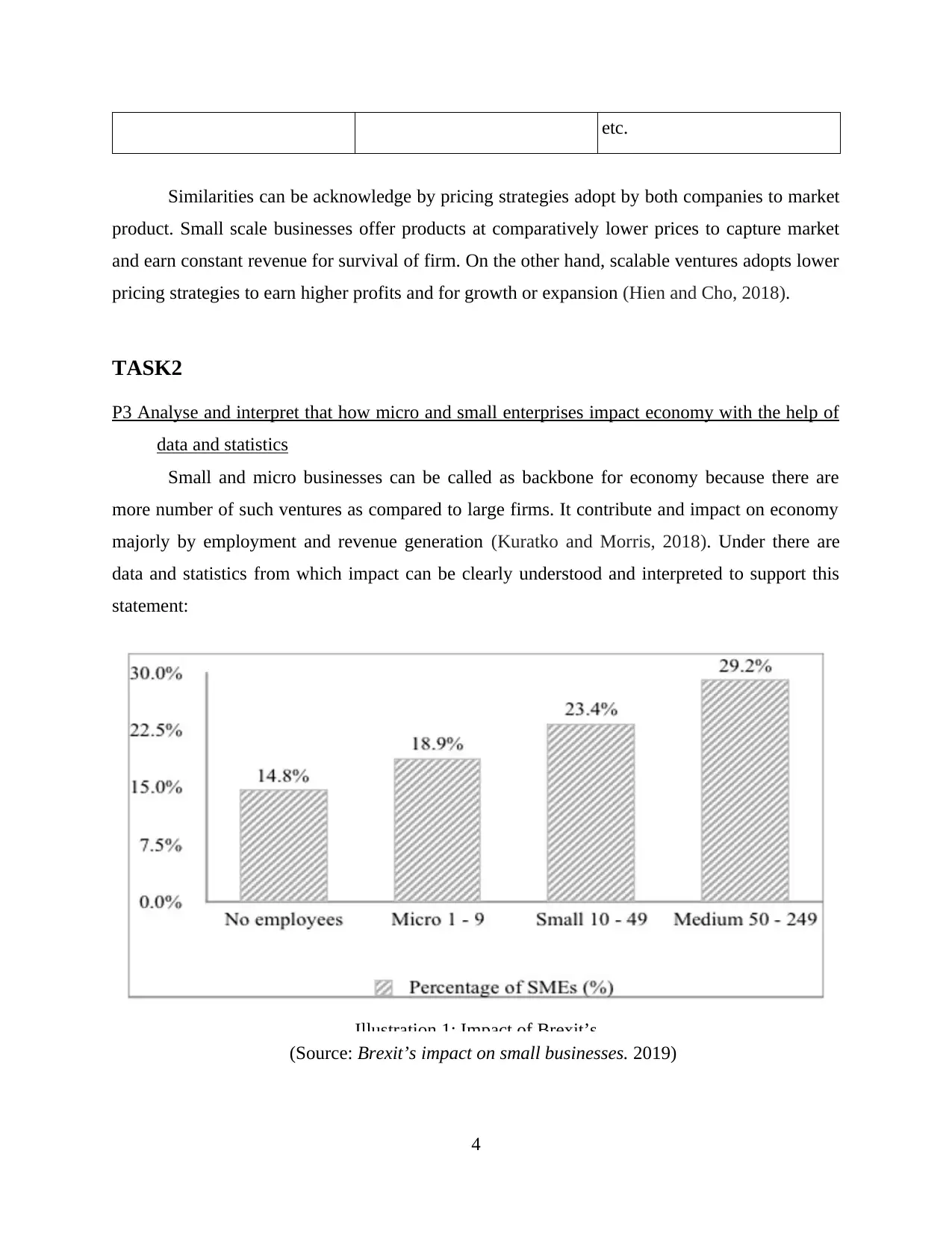
etc.
Similarities can be acknowledge by pricing strategies adopt by both companies to market
product. Small scale businesses offer products at comparatively lower prices to capture market
and earn constant revenue for survival of firm. On the other hand, scalable ventures adopts lower
pricing strategies to earn higher profits and for growth or expansion (Hien and Cho, 2018).
TASK2
P3 Analyse and interpret that how micro and small enterprises impact economy with the help of
data and statistics
Small and micro businesses can be called as backbone for economy because there are
more number of such ventures as compared to large firms. It contribute and impact on economy
majorly by employment and revenue generation (Kuratko and Morris, 2018). Under there are
data and statistics from which impact can be clearly understood and interpreted to support this
statement:
(Source: Brexit’s impact on small businesses. 2019)
4
Illustration 1: Impact of Brexit’s
Similarities can be acknowledge by pricing strategies adopt by both companies to market
product. Small scale businesses offer products at comparatively lower prices to capture market
and earn constant revenue for survival of firm. On the other hand, scalable ventures adopts lower
pricing strategies to earn higher profits and for growth or expansion (Hien and Cho, 2018).
TASK2
P3 Analyse and interpret that how micro and small enterprises impact economy with the help of
data and statistics
Small and micro businesses can be called as backbone for economy because there are
more number of such ventures as compared to large firms. It contribute and impact on economy
majorly by employment and revenue generation (Kuratko and Morris, 2018). Under there are
data and statistics from which impact can be clearly understood and interpreted to support this
statement:
(Source: Brexit’s impact on small businesses. 2019)
4
Illustration 1: Impact of Brexit’s
⊘ This is a preview!⊘
Do you want full access?
Subscribe today to unlock all pages.

Trusted by 1+ million students worldwide
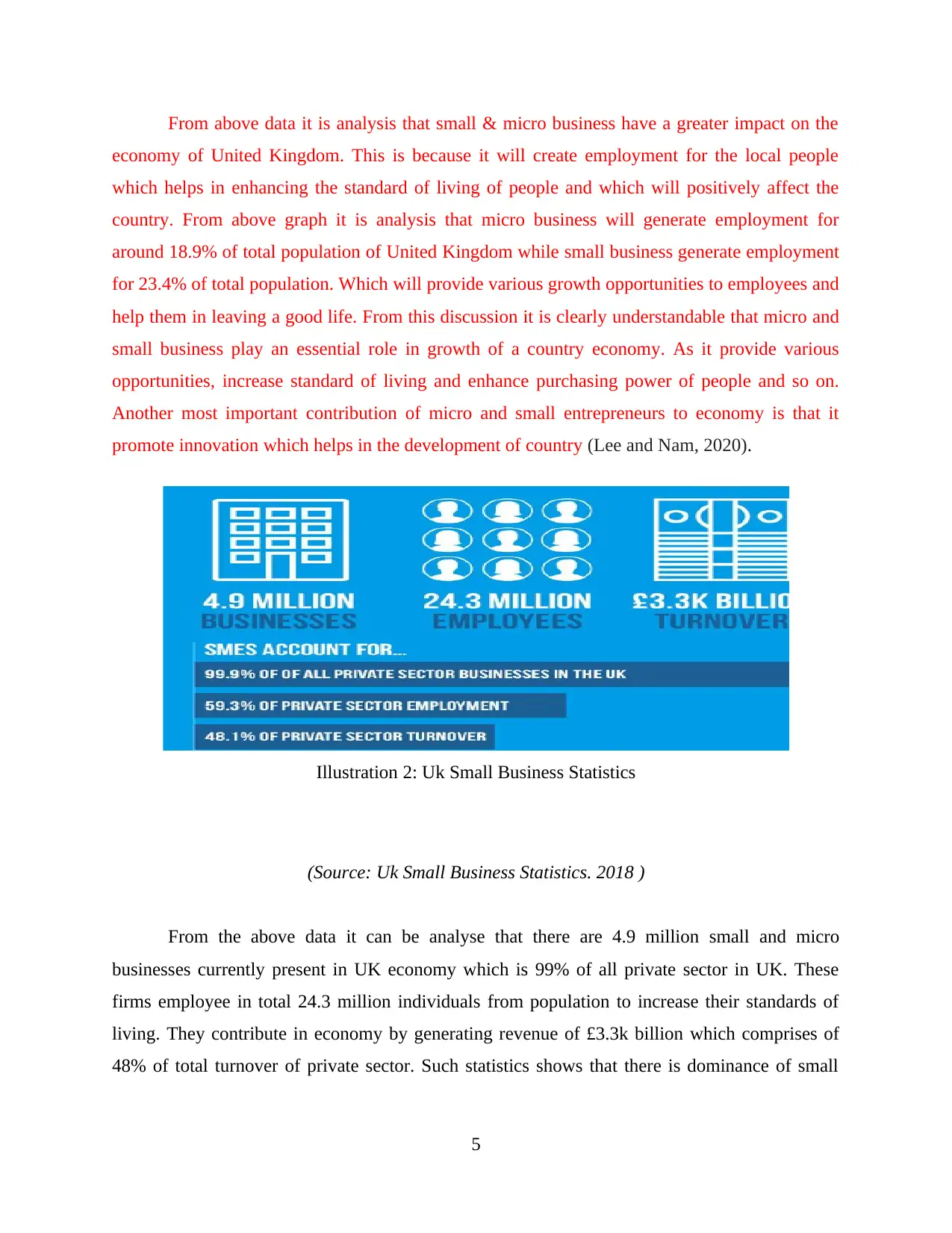
From above data it is analysis that small & micro business have a greater impact on the
economy of United Kingdom. This is because it will create employment for the local people
which helps in enhancing the standard of living of people and which will positively affect the
country. From above graph it is analysis that micro business will generate employment for
around 18.9% of total population of United Kingdom while small business generate employment
for 23.4% of total population. Which will provide various growth opportunities to employees and
help them in leaving a good life. From this discussion it is clearly understandable that micro and
small business play an essential role in growth of a country economy. As it provide various
opportunities, increase standard of living and enhance purchasing power of people and so on.
Another most important contribution of micro and small entrepreneurs to economy is that it
promote innovation which helps in the development of country (Lee and Nam, 2020).
(Source: Uk Small Business Statistics. 2018 )
From the above data it can be analyse that there are 4.9 million small and micro
businesses currently present in UK economy which is 99% of all private sector in UK. These
firms employee in total 24.3 million individuals from population to increase their standards of
living. They contribute in economy by generating revenue of £3.3k billion which comprises of
48% of total turnover of private sector. Such statistics shows that there is dominance of small
5
Illustration 2: Uk Small Business Statistics
economy of United Kingdom. This is because it will create employment for the local people
which helps in enhancing the standard of living of people and which will positively affect the
country. From above graph it is analysis that micro business will generate employment for
around 18.9% of total population of United Kingdom while small business generate employment
for 23.4% of total population. Which will provide various growth opportunities to employees and
help them in leaving a good life. From this discussion it is clearly understandable that micro and
small business play an essential role in growth of a country economy. As it provide various
opportunities, increase standard of living and enhance purchasing power of people and so on.
Another most important contribution of micro and small entrepreneurs to economy is that it
promote innovation which helps in the development of country (Lee and Nam, 2020).
(Source: Uk Small Business Statistics. 2018 )
From the above data it can be analyse that there are 4.9 million small and micro
businesses currently present in UK economy which is 99% of all private sector in UK. These
firms employee in total 24.3 million individuals from population to increase their standards of
living. They contribute in economy by generating revenue of £3.3k billion which comprises of
48% of total turnover of private sector. Such statistics shows that there is dominance of small
5
Illustration 2: Uk Small Business Statistics
Paraphrase This Document
Need a fresh take? Get an instant paraphrase of this document with our AI Paraphraser
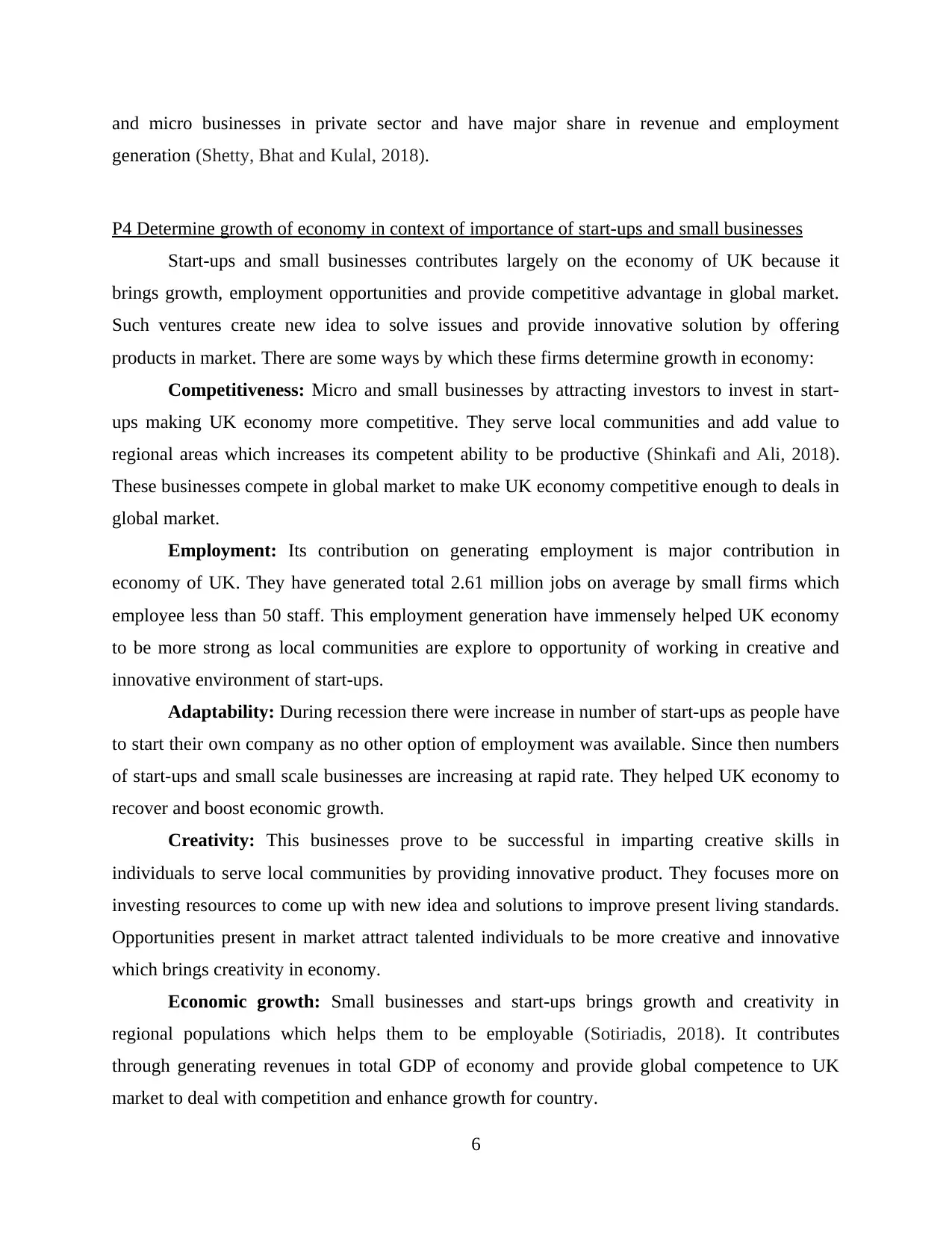
and micro businesses in private sector and have major share in revenue and employment
generation (Shetty, Bhat and Kulal, 2018).
P4 Determine growth of economy in context of importance of start-ups and small businesses
Start-ups and small businesses contributes largely on the economy of UK because it
brings growth, employment opportunities and provide competitive advantage in global market.
Such ventures create new idea to solve issues and provide innovative solution by offering
products in market. There are some ways by which these firms determine growth in economy:
Competitiveness: Micro and small businesses by attracting investors to invest in start-
ups making UK economy more competitive. They serve local communities and add value to
regional areas which increases its competent ability to be productive (Shinkafi and Ali, 2018).
These businesses compete in global market to make UK economy competitive enough to deals in
global market.
Employment: Its contribution on generating employment is major contribution in
economy of UK. They have generated total 2.61 million jobs on average by small firms which
employee less than 50 staff. This employment generation have immensely helped UK economy
to be more strong as local communities are explore to opportunity of working in creative and
innovative environment of start-ups.
Adaptability: During recession there were increase in number of start-ups as people have
to start their own company as no other option of employment was available. Since then numbers
of start-ups and small scale businesses are increasing at rapid rate. They helped UK economy to
recover and boost economic growth.
Creativity: This businesses prove to be successful in imparting creative skills in
individuals to serve local communities by providing innovative product. They focuses more on
investing resources to come up with new idea and solutions to improve present living standards.
Opportunities present in market attract talented individuals to be more creative and innovative
which brings creativity in economy.
Economic growth: Small businesses and start-ups brings growth and creativity in
regional populations which helps them to be employable (Sotiriadis, 2018). It contributes
through generating revenues in total GDP of economy and provide global competence to UK
market to deal with competition and enhance growth for country.
6
generation (Shetty, Bhat and Kulal, 2018).
P4 Determine growth of economy in context of importance of start-ups and small businesses
Start-ups and small businesses contributes largely on the economy of UK because it
brings growth, employment opportunities and provide competitive advantage in global market.
Such ventures create new idea to solve issues and provide innovative solution by offering
products in market. There are some ways by which these firms determine growth in economy:
Competitiveness: Micro and small businesses by attracting investors to invest in start-
ups making UK economy more competitive. They serve local communities and add value to
regional areas which increases its competent ability to be productive (Shinkafi and Ali, 2018).
These businesses compete in global market to make UK economy competitive enough to deals in
global market.
Employment: Its contribution on generating employment is major contribution in
economy of UK. They have generated total 2.61 million jobs on average by small firms which
employee less than 50 staff. This employment generation have immensely helped UK economy
to be more strong as local communities are explore to opportunity of working in creative and
innovative environment of start-ups.
Adaptability: During recession there were increase in number of start-ups as people have
to start their own company as no other option of employment was available. Since then numbers
of start-ups and small scale businesses are increasing at rapid rate. They helped UK economy to
recover and boost economic growth.
Creativity: This businesses prove to be successful in imparting creative skills in
individuals to serve local communities by providing innovative product. They focuses more on
investing resources to come up with new idea and solutions to improve present living standards.
Opportunities present in market attract talented individuals to be more creative and innovative
which brings creativity in economy.
Economic growth: Small businesses and start-ups brings growth and creativity in
regional populations which helps them to be employable (Sotiriadis, 2018). It contributes
through generating revenues in total GDP of economy and provide global competence to UK
market to deal with competition and enhance growth for country.
6
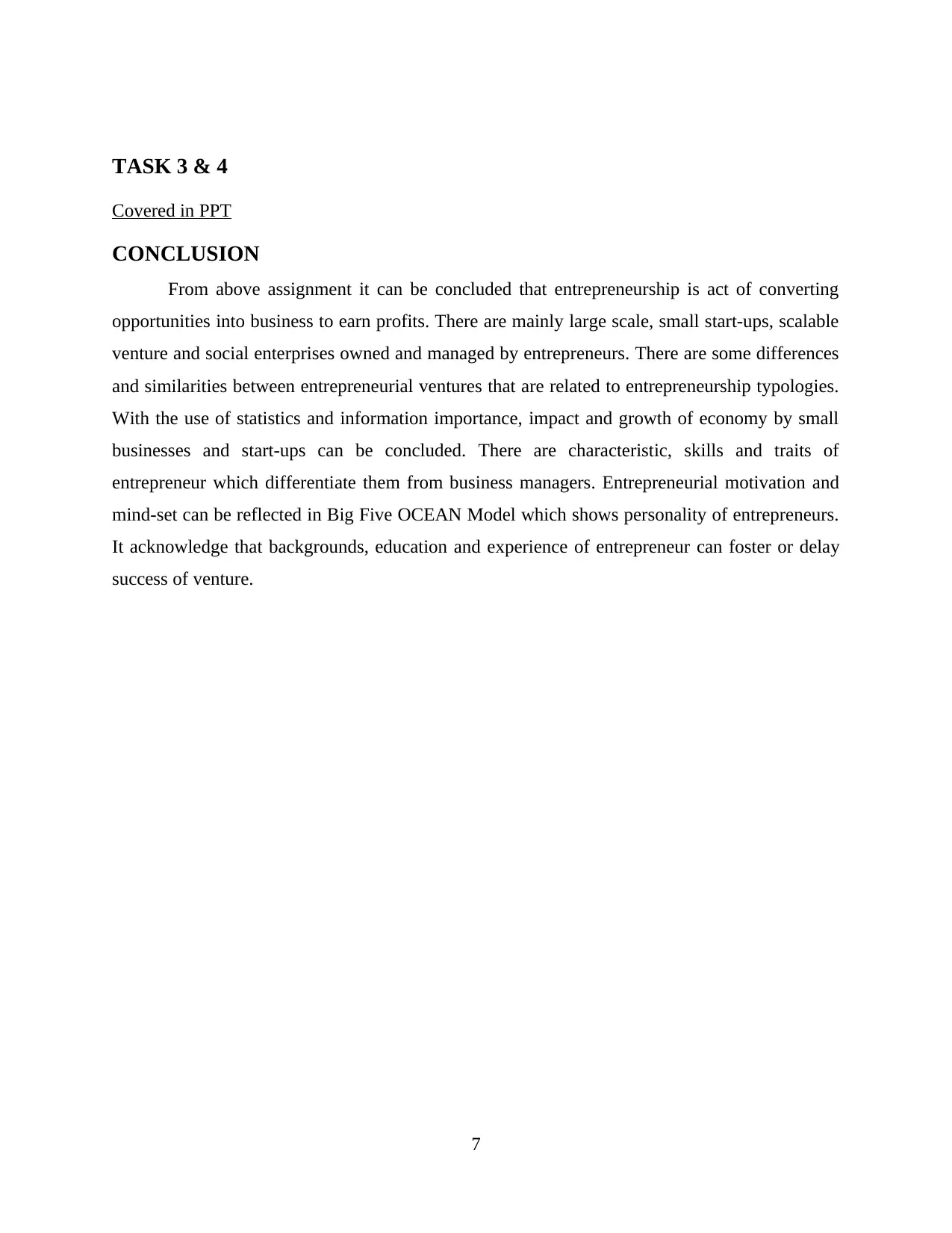
TASK 3 & 4
Covered in PPT
CONCLUSION
From above assignment it can be concluded that entrepreneurship is act of converting
opportunities into business to earn profits. There are mainly large scale, small start-ups, scalable
venture and social enterprises owned and managed by entrepreneurs. There are some differences
and similarities between entrepreneurial ventures that are related to entrepreneurship typologies.
With the use of statistics and information importance, impact and growth of economy by small
businesses and start-ups can be concluded. There are characteristic, skills and traits of
entrepreneur which differentiate them from business managers. Entrepreneurial motivation and
mind-set can be reflected in Big Five OCEAN Model which shows personality of entrepreneurs.
It acknowledge that backgrounds, education and experience of entrepreneur can foster or delay
success of venture.
7
Covered in PPT
CONCLUSION
From above assignment it can be concluded that entrepreneurship is act of converting
opportunities into business to earn profits. There are mainly large scale, small start-ups, scalable
venture and social enterprises owned and managed by entrepreneurs. There are some differences
and similarities between entrepreneurial ventures that are related to entrepreneurship typologies.
With the use of statistics and information importance, impact and growth of economy by small
businesses and start-ups can be concluded. There are characteristic, skills and traits of
entrepreneur which differentiate them from business managers. Entrepreneurial motivation and
mind-set can be reflected in Big Five OCEAN Model which shows personality of entrepreneurs.
It acknowledge that backgrounds, education and experience of entrepreneur can foster or delay
success of venture.
7
⊘ This is a preview!⊘
Do you want full access?
Subscribe today to unlock all pages.

Trusted by 1+ million students worldwide
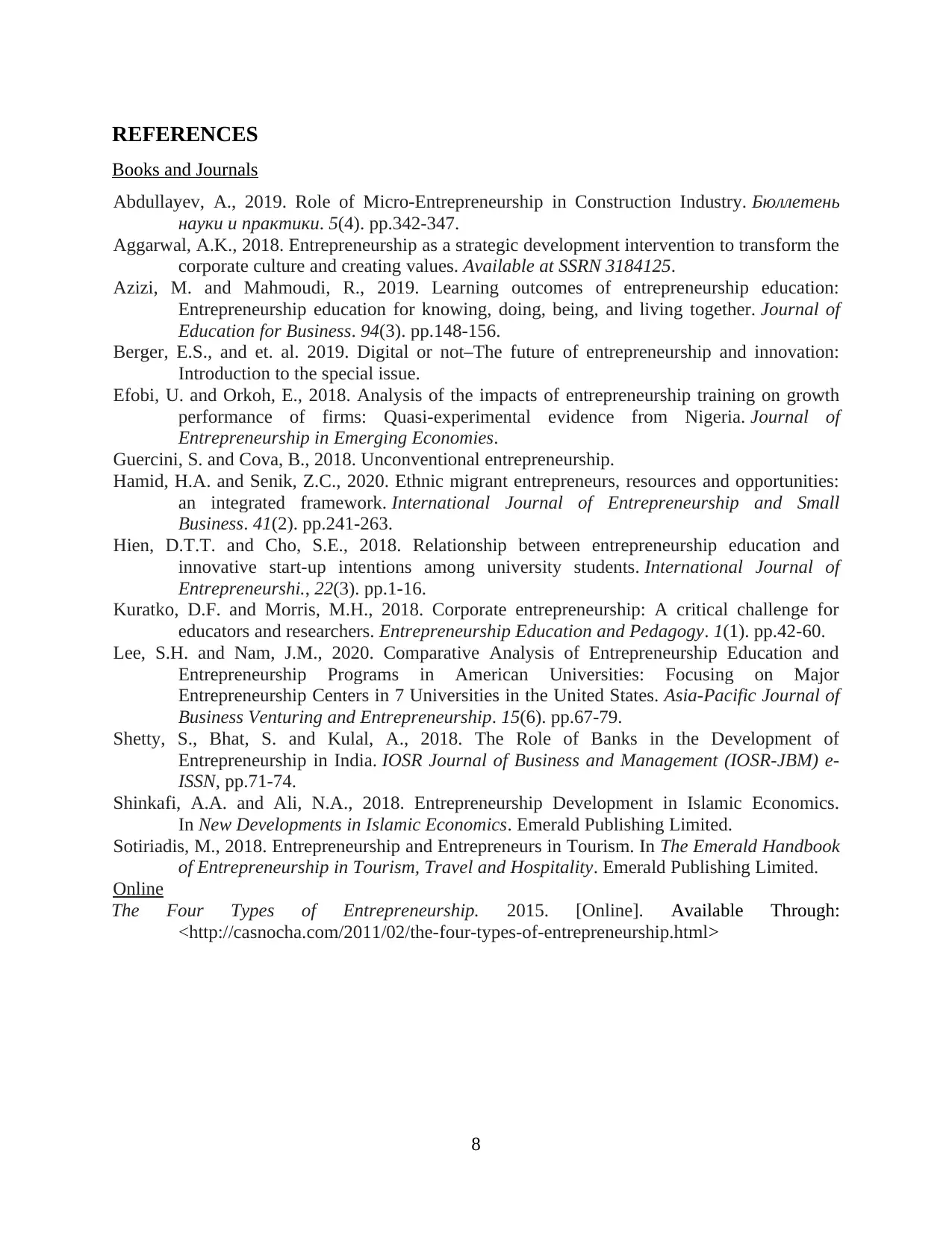
REFERENCES
Books and Journals
Abdullayev, A., 2019. Role of Micro-Entrepreneurship in Construction Industry. Бюллетень
науки и практики. 5(4). pp.342-347.
Aggarwal, A.K., 2018. Entrepreneurship as a strategic development intervention to transform the
corporate culture and creating values. Available at SSRN 3184125.
Azizi, M. and Mahmoudi, R., 2019. Learning outcomes of entrepreneurship education:
Entrepreneurship education for knowing, doing, being, and living together. Journal of
Education for Business. 94(3). pp.148-156.
Berger, E.S., and et. al. 2019. Digital or not–The future of entrepreneurship and innovation:
Introduction to the special issue.
Efobi, U. and Orkoh, E., 2018. Analysis of the impacts of entrepreneurship training on growth
performance of firms: Quasi-experimental evidence from Nigeria. Journal of
Entrepreneurship in Emerging Economies.
Guercini, S. and Cova, B., 2018. Unconventional entrepreneurship.
Hamid, H.A. and Senik, Z.C., 2020. Ethnic migrant entrepreneurs, resources and opportunities:
an integrated framework. International Journal of Entrepreneurship and Small
Business. 41(2). pp.241-263.
Hien, D.T.T. and Cho, S.E., 2018. Relationship between entrepreneurship education and
innovative start-up intentions among university students. International Journal of
Entrepreneurshi., 22(3). pp.1-16.
Kuratko, D.F. and Morris, M.H., 2018. Corporate entrepreneurship: A critical challenge for
educators and researchers. Entrepreneurship Education and Pedagogy. 1(1). pp.42-60.
Lee, S.H. and Nam, J.M., 2020. Comparative Analysis of Entrepreneurship Education and
Entrepreneurship Programs in American Universities: Focusing on Major
Entrepreneurship Centers in 7 Universities in the United States. Asia-Pacific Journal of
Business Venturing and Entrepreneurship. 15(6). pp.67-79.
Shetty, S., Bhat, S. and Kulal, A., 2018. The Role of Banks in the Development of
Entrepreneurship in India. IOSR Journal of Business and Management (IOSR-JBM) e-
ISSN, pp.71-74.
Shinkafi, A.A. and Ali, N.A., 2018. Entrepreneurship Development in Islamic Economics.
In New Developments in Islamic Economics. Emerald Publishing Limited.
Sotiriadis, M., 2018. Entrepreneurship and Entrepreneurs in Tourism. In The Emerald Handbook
of Entrepreneurship in Tourism, Travel and Hospitality. Emerald Publishing Limited.
Online
The Four Types of Entrepreneurship. 2015. [Online]. Available Through:
<http://casnocha.com/2011/02/the-four-types-of-entrepreneurship.html>
8
Books and Journals
Abdullayev, A., 2019. Role of Micro-Entrepreneurship in Construction Industry. Бюллетень
науки и практики. 5(4). pp.342-347.
Aggarwal, A.K., 2018. Entrepreneurship as a strategic development intervention to transform the
corporate culture and creating values. Available at SSRN 3184125.
Azizi, M. and Mahmoudi, R., 2019. Learning outcomes of entrepreneurship education:
Entrepreneurship education for knowing, doing, being, and living together. Journal of
Education for Business. 94(3). pp.148-156.
Berger, E.S., and et. al. 2019. Digital or not–The future of entrepreneurship and innovation:
Introduction to the special issue.
Efobi, U. and Orkoh, E., 2018. Analysis of the impacts of entrepreneurship training on growth
performance of firms: Quasi-experimental evidence from Nigeria. Journal of
Entrepreneurship in Emerging Economies.
Guercini, S. and Cova, B., 2018. Unconventional entrepreneurship.
Hamid, H.A. and Senik, Z.C., 2020. Ethnic migrant entrepreneurs, resources and opportunities:
an integrated framework. International Journal of Entrepreneurship and Small
Business. 41(2). pp.241-263.
Hien, D.T.T. and Cho, S.E., 2018. Relationship between entrepreneurship education and
innovative start-up intentions among university students. International Journal of
Entrepreneurshi., 22(3). pp.1-16.
Kuratko, D.F. and Morris, M.H., 2018. Corporate entrepreneurship: A critical challenge for
educators and researchers. Entrepreneurship Education and Pedagogy. 1(1). pp.42-60.
Lee, S.H. and Nam, J.M., 2020. Comparative Analysis of Entrepreneurship Education and
Entrepreneurship Programs in American Universities: Focusing on Major
Entrepreneurship Centers in 7 Universities in the United States. Asia-Pacific Journal of
Business Venturing and Entrepreneurship. 15(6). pp.67-79.
Shetty, S., Bhat, S. and Kulal, A., 2018. The Role of Banks in the Development of
Entrepreneurship in India. IOSR Journal of Business and Management (IOSR-JBM) e-
ISSN, pp.71-74.
Shinkafi, A.A. and Ali, N.A., 2018. Entrepreneurship Development in Islamic Economics.
In New Developments in Islamic Economics. Emerald Publishing Limited.
Sotiriadis, M., 2018. Entrepreneurship and Entrepreneurs in Tourism. In The Emerald Handbook
of Entrepreneurship in Tourism, Travel and Hospitality. Emerald Publishing Limited.
Online
The Four Types of Entrepreneurship. 2015. [Online]. Available Through:
<http://casnocha.com/2011/02/the-four-types-of-entrepreneurship.html>
8
Paraphrase This Document
Need a fresh take? Get an instant paraphrase of this document with our AI Paraphraser

9
1 out of 11
Related Documents
Your All-in-One AI-Powered Toolkit for Academic Success.
+13062052269
info@desklib.com
Available 24*7 on WhatsApp / Email
![[object Object]](/_next/static/media/star-bottom.7253800d.svg)
Unlock your academic potential
Copyright © 2020–2026 A2Z Services. All Rights Reserved. Developed and managed by ZUCOL.



